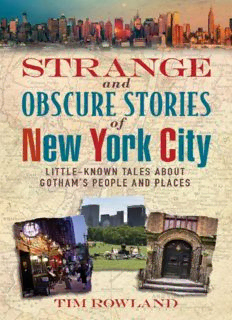
Strange and Obscure Stories of New York City: Little-Known Tales About Gotham’s People and Places PDF
Preview Strange and Obscure Stories of New York City: Little-Known Tales About Gotham’s People and Places
Copyright © 2016 by Tim Rowland All rights reserved. No part of this book may be reproduced in any manner without the express written consent of the publisher, except in the case of brief excerpts in critical reviews or articles. All inquiries should be addressed to Skyhorse Publishing, 307 West 36th Street, 11th Floor, New York, NY 10018. Skyhorse Publishing books may be purchased in bulk at special discounts for sales promotion, corporate gifts, fund-raising, or educational purposes. Special editions can also be created to specifications. For details, contact the Special Sales Department, Skyhorse Publishing, 307 West 36th Street, 11th Floor, New York, NY 10018, or [email protected]. Skyhorse® and Skyhorse Publishing® are registered trademarks of Skyhorse Publishing, Inc.®, a Delaware corporation. Visit our website at www.skyhorsepublishing.com. 10 9 8 7 6 5 4 3 2 1 Library of Congress Cataloging-in-Publication Data is available on file. Cover design by Jane Sheppard Cover photos: iStockphoto Print ISBN: 978-1-5107-0012-3 Ebook ISBN: 978-1-51070013-0 Printed in the United States of America To Beth, for believing in me more than I believe in myself. Table of Contents Preface CHAPTER 1 Selling the Public on a Jump from the Brooklyn Bridge CHAPTER 2 A Humble Printer Establishes Freedom of the Press CHAPTER 3 Botched Abortion, Botched Justice CHAPTER 4 The US Mail Underfoot CHAPTER 5 The Grand Slave Conspiracy that Wasn’t CHAPTER 6 Mark Twain Takes New York by Storm and Spirit CHAPTER 7 The Rise and Fall of Little Germany CHAPTER 8 New York’s Cross-Dressing Governor CHAPTER 9 A Deadly Battle of Shakespearean Actors CHAPTER 10 Woodlawn Cemetery’s Celebrated Clientele CHAPTER 11 A Building and a Food Fight for the Ages CHAPTER 12 New York’s New Insane Classes, and the Woman Who Fought for Them CHAPTER 13 New York Declares War on Pigs CHAPTER 14 A Floating City of Liquor CHAPTER 15 A Lake Gets Its Revenge on Manhattan Sources Photo Insert Preface In New York City, it goes without saying, strange stories are a dime a dozen. The chore is not to ferret them out, the chore is to narrow the selection down. Obscure stories are harder to find, since the city is blessed with an uncountable amount of excellent books, blogs, and websites that have dutifully catalogued and chronicled just about everything that’s happened in New York since the Earth cooled. So if the historical essays presented here are more strange than they are obscure, this is why. It is hoped, however, that they will add layers and context that give added meaning and amusement to readers, even if they have heard in passing that, say, New York had a cross-dressing governor or that the US mail once sailed along in tubes buried beneath city sidewalks. What is also striking is the degree to which New York reflects the nation at large. Yankees though they might have been, the city had slave riots that rivaled anything in the South, and at the time of the Civil War, Mayor Fernando Wood even agitated for secession from the Union. New Yorkers were at the fore in undercutting prohibition. They witnessed a steamboat demonstration that predated Robert Fulton’s by twenty years. The rhetoric of its leaders in commerce soared to the stars and set the tone for the nation, yet it produced criminals so shameless and rank that it was hard to think of them as human. A maître d’ in New York could accumulate more fame and adoration than a deacon in any other town. In everything from architecture, to design, to sports, to politics, New York set the standard—it might not always have been a pretty standard, but it was a standard that could never be ignored. So if its stories (even the obscure ones) are strange, wonderful, and, like the city itself, they cannot be ignored. 1 C HAPTER Selling the Public on a Jump from the Brooklyn Bridge In all probability, on a midsummer day in 1886, a twenty-five-year-old man named Steve Brodie joined thousands of other New Yorkers by not jumping off the Brooklyn Bridge. No matter. The young huckster from the Bowery parlayed this nonevent into a storied career that lives on in the annals of history, pop culture, and showmanship. There is, however, just that chance that he did jump; like Brodie himself, that facts that surround that July day are hopelessly complex. The Brooklyn Bridge had been completed in 1883, and the engineering marvel had captured the imagination of New Yorkers almost from the day that it was proposed in a set of improbable architectural sketches. Dubbed one of the Seven Wonders of the Industrial World, one hundred and fifty thousand pedestrians and eighteen hundred vehicles crossed the bridge into history on its opening day. A week later, a rumor spread that the massive stone structure was in imminent danger of collapse. The news caused a stampede that killed a dozen people. Sensing an opportunity, the legendary P. T. Barnum later paraded twenty-one elephants across the bridge to prove its stability. But with a height of 135 feet, equal to a fourteen-story building, from the decking to the water, the bridge quickly attracted the attention of daredevils, who contemplated the odds of leaping from the bridge and surviving. The first was Robert Emmet Odlum, a swimming instructor from a family torn by the Civil War, who taught aquatic skills to the children of such
Description: